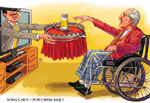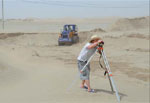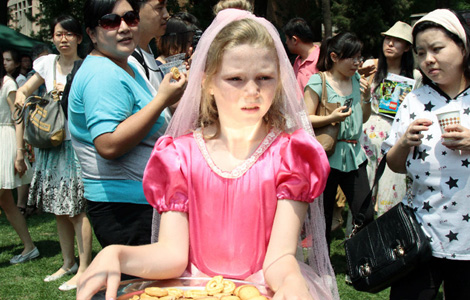Campaign to help moms find breastfeeding rooms
Updated: 2013-05-31 02:07
By He Dan (China Daily)
|
|||||||||||
A national campaign promoting breastfeeding rooms in workplaces and public building was launched in Beijing on Thursday to help more babies benefit from "natural food".
The United Nations Children's Fund and the National Center for Women and Children's Health launched the "10m2 of Love" campaign as a prelude to celebrations of International Children's Day, which falls on Saturday.
The campaign organizers have established a web portal — unicef.cn/10m2 — where any organization can register breastfeeding rooms for employees or customers that adhere to international standards.
The suggested criteria for establishing such facilities in public buildings include a clean room with moderate temperature, a low and comfortable chair and wash basin or hand sanitizer. Formula advertisements and similar information is banned. In workplaces, extra requirements include an electric socket, so working mothers can use a milk pump, and a storage space for breast milk.
The campaigners are also working on a mobile phone application that can map the locations of all breastfeeding facilities in China. They plan to launch the app this year.
Dale Rutstein, chief of communication at the UNICEF China office, said there is little information to show how many private spaces there are for breastfeeding in workplaces and public buildings in China.
"That's also one reason for us to create a database (on the mobile app)," he said.
"Breast milk is nature's true super food for babies. No artificial substitute compares," said Gillian Mellsop, UNICEF China representative.
"Yet, it is harder than ever to find time or space to give babies all the benefits associated with exclusive breastfeeding for six months. Many things need to be done but we decided to start by supporting mothers trying to continue breastfeeding after their return to work," she said.
Sun Xiaoyu, a kindergarten teacher who has breastfed her baby girl for the past 14 months since she was born, said she has to pump milk in the toilet at work and in many public places that lack breastfeeding rooms.
"I feel uncomfortable about the hygiene issue of pumping milk in toilets, so sometimes I have to throw that milk away," she said.
The 32-year-old said when she takes her child out, she has to bring a bottle of formula milk or even a cookie as a backup plan because in most cases she cannot find such breastfeeding rooms and feels too embarrassed to breastfeed in public.
The rate of exclusive breastfeeding until the internationally recommended standard of six months has kept falling in Asia, said Mellsop, adding that in China only about 28 percent of mothers have managed to do so.
The situation is gradually changing in China thanks to advocacy and media reports of breastfeeding's advantages.
"I asked a friend to buy milk powder for me from the US after I got pregnant, but later I was lucky to get from another friend a brochure that teaches new moms the idea of breastfeeding, so I decided to breastfeed," said Chen Zhiming, a mother of a 19-month-old boy in Beijing.
"My son is taller and heavier than most of his peers," said Chen, 28.
Rutstein from UNICEF said more than 30 companies, including big domestic and transnational companies in eight cities, have joined the campaign since his organization released information via social media.
He said dozens of volunteers from 15 cities have been mobilized to promote the campaign and give consultations to companies and public institutions.
Wang Lixin, a child-nursing expert retired from the National Center for Women and Children's Health, said that although companies with more than five breastfeeding employees are required by law to set up a special room in the workplaces, the law has not been enforced well.
Such a campaign will help promote the idea and pressure employers to take action to create a friendly environment for breastfeeding mothers, she said.
Related Stories
Breastfeeding app launched in Shanghai 2013-05-16 01:55
Breast-feeding needs more public support 2013-03-13 02:54
Govt to promote breastfeeding for newborns 2012-08-01 21:48
Today's Top News
Thousands busted in identity theft cases
County official under investigation for nepotism
China not pressuring EU members on solar panels
Chinese tourists expenditure rise biggest
Italy removed from EU's deficit list
Germany to pay $1b for ageing Holocaust victims
Beijing seeks cooperation with US on cyberattacks
China to speed up service growth
Hot Topics
Lunar probe , China growth forecasts, Emission rules get tougher, China seen through 'colored lens', International board,
Editor's Picks

|

|

|

|

|

|





